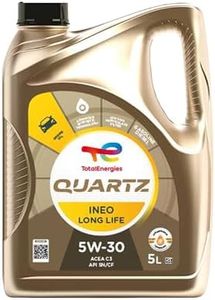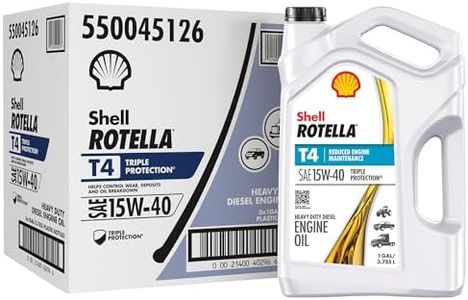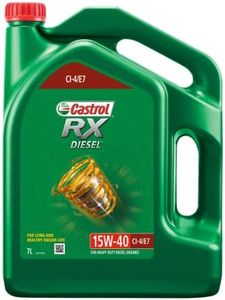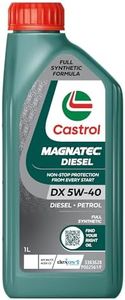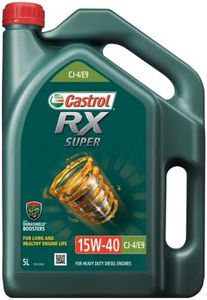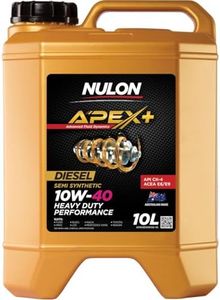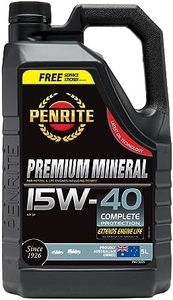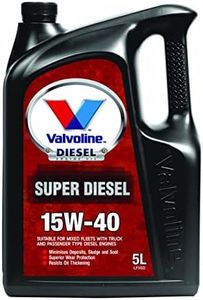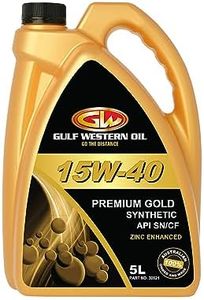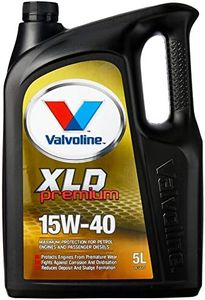We Use CookiesWe use cookies to enhance the security, performance,
functionality and for analytical and promotional activities. By continuing to browse this site you
are agreeing to our privacy policy
10 Best Diesel Engine Oils
From leading brands and best sellers available on the web.By clicking on a link to a third party's website, log data is shared with that third party.
Buying Guide for the Best Diesel Engine Oils
Choosing the right diesel engine oil is crucial for keeping your engine running smoothly, extending its lifespan, and ensuring it performs well. Diesel engines have specific requirements compared to gasoline engines, so using the correct oil protects against wear, helps with fuel efficiency, and ensures your engine remains clean inside. The right oil choice depends on your engine’s age, how hard you work it, and the climate you operate in. Understanding the key specs on the oil container will help you match the oil to your vehicle’s needs.Viscosity GradeViscosity grade describes how thick or thin the oil is at different temperatures. It's typically shown as something like 15W-40. The first number (before the W, which stands for Winter) shows how the oil flows at cold temperatures, while the second number shows how it performs when the engine is hot. Lower first numbers mean better cold starts, while higher second numbers mean the oil remains protective at high heat. Choose a viscosity that matches your climate and what your manual recommends: colder climates often need lower first numbers for easier starting, while hotter conditions or heavy-duty use might need higher second numbers for better protection.
API Service ClassificationThis specification is set by the American Petroleum Institute and is usually shown by a code like 'CK-4' or 'CJ-4.' It tells you the oil meets standards required for different diesel engine types and their emission systems. Newer classifications indicate the oil is suitable for modern engines with better performance and emission protection. Always check your engine’s manual for the required API classification and choose oil that matches or exceeds these recommendations to ensure proper protection and warranty coverage.
Synthetic vs. Conventional OilDiesel oils come in both synthetic and conventional forms. Synthetic oils are man-made for consistent quality and often provide better protection in extreme temperatures and under heavy load. Conventional oils are made from refined natural oil and may work fine for older or lightly used engines. If you drive long distances, haul heavy loads, or experience temperature extremes, synthetic oil could offer better protection and potentially longer oil change intervals. For typical daily driving or older engines, conventional oil may be sufficient.
Additive PackageEngine oils contain additives that help with preventing wear, controlling deposits, reducing foam, and protecting against rust. Some oils are designed for engines with exhaust systems that use Diesel Particulate Filters (DPF), requiring low levels of certain additives to avoid damaging these filters. Look for information on protection against 'soot control,' 'wear protection,' and compatibility with emission systems. Pick an oil whose additives match your engine type and its emissions controls to ensure reliability and longevity.
Change Interval RecommendationsSome oils are designed for extended drain intervals, meaning you can go longer between oil changes, while others are best for shorter, more frequent intervals. Longer drain oils are often used for commercial vehicles that rack up miles quickly. Your choice should depend on your driving routine and what your owner’s manual recommends. Following these recommendations ensures your engine gets timely fresh oil and prevents premature wear or buildup.
